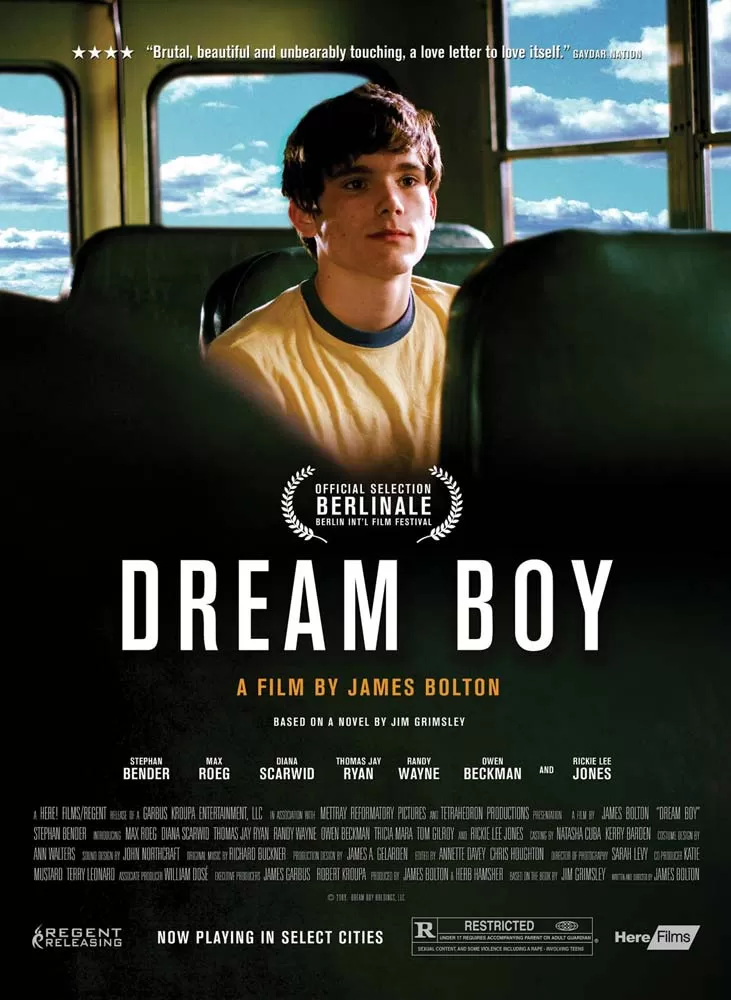Dream Boy (2008)
James Bolton’s Dream Boy (2008) intertwines a delicate romance with dark, haunting elements, delving into the tender yet complicated bond shared by two gay teenagers in rural Louisiana during the 1970s.
Introducing the Main Characters
At first, Nathan (played by Stephan Bender) is the quiet, introverted teen who usually stays to himself, grappling with serious family issues. On the other hand, Roy (Max Roeg) is the confident, popular guy with a much clearer sense of self. When the two cross paths, there’s an immediate connection, sparking a secret and emotionally charged romance.
“The film places a lot of focus on subtle, non-verbal communication—like glances, lingering stares, half-smiles, and even physical touches—which gives a much more realistic portrayal of young gay love than those more talkative gay coming-of-age flicks.”
Strong Direction and Performances
One of the standout elements of Dream Boy (2008) is Bolton’s sensitive direction, which captures the rawness of first love with precision. This vulnerability is starkly contrasted with the heavy family secrets and the oppressive nature of a small southern town. Additionally, the film handles Nathan’s traumatic home life with care, especially in his relationship with his authoritarian father (Thomas Jay Ryan), whose disturbing past casts a shadow over Nathan’s growing relationship with Roy.
Stephan Bender’s performance as Nathan is quietly powerful, embodying the nervousness, awkwardness, and unspoken desire that are characteristic of adolescence. His portrayal feels incredibly authentic and relatable. Similarly, Max Roeg convincingly portrays a young man torn between societal expectations and his own emotions. The chemistry between the two leads makes Dream Boy (2008) an emotionally charged and compelling experience.
Notable Imperfections
While Dream Boy (2008) is certainly impactful, it’s not without its flaws. For one, some supporting characters could benefit from more development, and the pacing tends to lag at times, particularly when the film delves into the ghost story subplot. Furthermore, the conclusion of the film leaves certain questions unanswered, which may be frustrating for viewers who prefer neat, well-rounded resolutions.
Exploring the Deeper Themes
Despite its imperfections, Dream Boy (2008) explores important themes like gay love and self-identity in a meaningful way. The stunning visuals, carefully crafted lighting, and evocative music elevate the film’s emotional resonance, underscoring the isolation and closeness felt by the characters.
Additionally, the film doesn’t shy away from addressing homophobia and the societal pressures LGBTQ+ youth endure, offering a relatable and powerful commentary on the challenges faced by young people in conservative environments. As a result, the film transcends a simple love story, presenting a raw and authentic depiction of resilience in the face of adversity.
Final Thoughts
In conclusion, Dream Boy (2008) may not be for everyone, especially due to its slower pace and understated storytelling style. However, for viewers who value deeply crafted character development and emotionally honest portrayals, the film offers a moving and rewarding experience.






